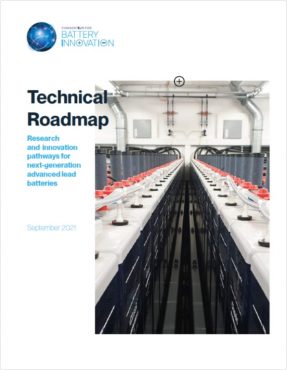
Solar panels for the Center for Microgrid Research stand atop McCarthy Gym, University of St. Thomas. Photo credit: Mark Brown/University of St. Thomas
In this Part 1 blog, our guest blogger Dr. Matt Raiford, manager for the Consortium for Battery Innovation (CBI), takes us through the extensive lead battery-focused university research programs that are advancing lead batteries for the evolving technical demand of booming industries such as energy storage and low-emission mobility.

Part 1
There is an innovation wave underway in lead battery technology. In universities and national laboratories across the U.S., research projects are opening up new pathways for understanding and enhancing the performance of lead batteries.
As the current administration moves steadily towards a low-carbon future, through ambitious programs accelerating new energy storage technology development, and demonstrated through the pledge to cut carbon emissions in half by 2030, lead batteries have a vital role to play.
In a CBI project with UCLA, in-situ TEM of lead battery electrodes is depicting expansion and growth processes of the active material via real-time imaging. This kind of scientific insight is shedding new light into failure modes of lead batteries, working towards providing a deeper understanding for how to optimize the battery for grid energy storage and low-emission vehicles.

In Minnesota’s University of St. Thomas, pioneering research is underway into microgrids utilizing lead batteries. A critical application in the shift to reliable and renewable energy, microgrids are booming in demand across the U.S. and further afield.
With studies taking place in the dedicated St. Thomas Center for Microgrid Research, the microgrid features a 125 kW/396 kWh lead battery system, a 48 kW solar array and the capability to emulate different electrical sources or loads using state-of-the-art electrical power research equipment. With its connection to the grid, the facility is helping to both develop technology and train new engineers to shape the future of energy.
Battery improvement from a systems level is being studied by the CALCE Battery Team at the University of Maryland, focusing on lead batteries utilizing a complement of modelling techniques and battery management research. The aim is to improve the lifetime of lead batteries and other forms of electrochemical storage, a key technical parameter for utility, renewable energy storage and automotive applications.
A cross-disciplinary team at Columbia University are studying smart charging algorithms and machine learning methodologies in lead battery packs. This kind of research is invaluable, and the improvements are being applied directly through a CBI research collaboration with Electric Applications Incorporated (EAI) using novel charge control methods to maximize lead battery string life.
Over the last three decades, CBI’s research program has focused on many different components in lead battery electrodes, including expanders, which are vital for performance. In the newest project to be launched between U.S.-based research teams and the lead battery industry is a collaborative effort with the University of Toledo and Argonne National Laboratory (ANL).
Organized by the American Battery Research Group in an effort geared towards maximizing energy throughput and charge acceptance in lead battery electrodes, it will involve designing, producing and testing new organic expander molecules.
Universities are just one of the scientific sectors to be focusing their research efforts of advancing lead batteries for the evolving technical demand of booming industries such as energy storage and low-emission mobility.
Part 2 will feature the pioneering scientific research underway in collaboration with U.S. national laboratories.
About the Consortium for Battery Innovation
The Consortium for Battery Innovation (CBI) is a pre-competitive research organization funding research into lead batteries for energy storage, motive and automotive applications. For more than 25 years, with its membership of battery manufacturers, industry suppliers, research institutes and universities, CBI has delivered cutting-edge research pushing the boundaries of innovation in lead battery technology. Their membership comprises the majority of U.S.-based companies from the entire lead battery value chain. Through research partnerships with scientific institutions including the Department of Energy’s Argonne National Laboratory and UCLA, CBI is setting the standard for advanced lead batteries and the next generation of energy storage.








